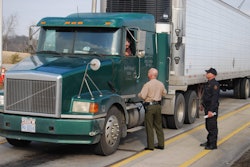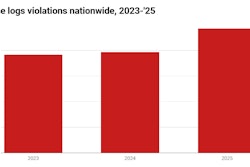New Mexico is considering a bill to allow permits for certain overweight loads from Mexico, while Arizona has a pilot program on a similar matter.
The Special Overweight Vehicle Permit Issuance bill would allow permits for overweight trucks within a 6-mile radius of a New Mexico commercial border crossing. It would be issued for certain reducible loads, which are loads that can be easily reduced, such as sand or building products. The state allows special permitting for non-reducible loads.
The bill, HB 24, would create the permits for a gross vehicle weight maximum of 96,000 pounds on eligible reducible loads.
Mexico allows higher truck weights than in Texas and New Mexico, according to the bill’s fiscal impact report. These reducible loads must be partially offloaded to meet the state’s legal weight before crossing border ports. The offloaded product then is reloaded onto a second commercial vehicle in Mexico before arriving in New Mexico.
The legislation could create a niche market for New Mexico, a land port, because overweight limits at the nearby El Paso, Texas, port cannot be increased because of federal weight restrictions on Rio Grande River bridges.
New Mexico’s transportation department said accommodating a foreign country’s vehicles to New Mexico laws will lead to U.S. trucking companies to request the same accommodations.

The legislation would increase maintenance requirements on affected roadways and the state’s pavement design would need changes to account for heavier loads. The three affected bridges would have a reduced lifespan and higher maintenance costs.
On May 17, the Arizona transportation department began the Single Trip Overweight Border Permit pilot program. The new permit allows trucks from Mexico weighing 80,001-90,800 pounds to deliver fresh produce in a sealed container to the Nogales commercial zone.
The state DOT said the permit, which later may be tried in other Arizona ports, will not create safety risks and will decrease congestion.










